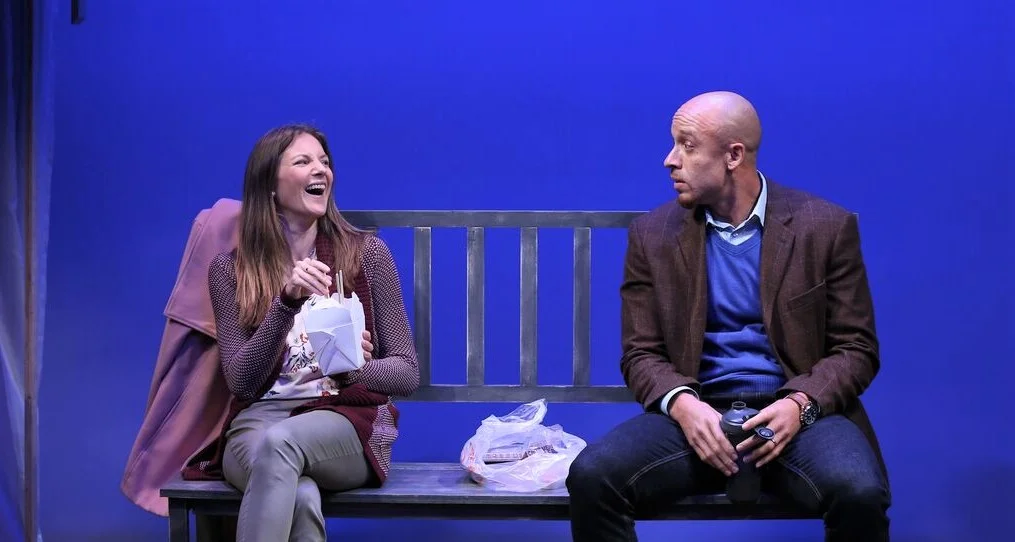The inherent tensions of sibling rivalry, a father and son reunion and a budding office romance drive the three 30-minute plays that make up the uneven Series B of this year’s Summer Shorts festival, presented by Throughline Artists. And, perhaps unintentionally, this showcase of new American one-acts is also a lesson in how the invention of the smartphone has changed the craft of playwriting.
The Possibilities/The After-Dinner Joke
In what has become a rite of summer in New York, the Potomac Theatre Project (PTP) has taken up residence at the Atlantic Stage 2. The company’s first offering is a double bill featuring Howard Barker’s The Possibilities, directed by Richard Ramagnoli, and Caryl Churchill’s The After-Dinner Joke, directed by Cheryl Faraone. Although stylistically quite different, the plays generally fit together well in their emotionally dizzying and intellectually disorienting exploration of power and politics.
The Saintliness of Margery Kempe
Can a sinner become a saint? That is the question John Wulp explores in The Saintliness of Margery Kempe, first produced in 1958 at the Poet’s Theatre in Cambridge, Mass., and last seen in an Off-Broadway production the following year. The story is loosely based on the real life of Margery Kempe, a woman who lived in the 14th century and wrote the first known autobiography in Western literature. At the beginning of the play, Margery (the wonderful Andrus Nichols, who brings an energetic intensity to the role) declares, “Morality, damn all morality, damn, damn, damn.” A feminist long before the feminist movement, she seeks to shrug off the assumptions that inform her role as mother, housewife and religious community member. She hates it all and leaves home.
Skintight
Jodi (Idina Menzel), the fortysomething central character in Joshua Harmon’s attention-grabbing new drama, Skintight, is having a bad time. She has arrived unannounced at her father’s Greenwich Village townhouse to help celebrate his 70th birthday, even though she has been warned not to by her dad. But she’s determined to connect with those who love her in her time of trial: in Los Angeles she has just attended the wedding of her ex-husband to a perky young 25-year-old.
Log Cabin
Arriving during gay pride month, Jordan Harrison’s new play explores currents of non-heterosexual identity in a nearly comprehensive way. Its characters cover the waterfront in terms of gender fluidity, with side trips to racial and class identity. Allen Moyer’s primary set is an apartment with ceiling-high bookcases and comfortable modern furniture. In spite of the elegance, however, Harrison’s characters might as well be living in the titular log cabin. They are sexual pioneers lost in a wilderness of fluctuating gender identity rather than ferocious animals and untamed nature.
All I Want Is One Night
Time has not been kind to Suzy Solidor, the Parisian nightclub sensation of the 1930s. Solidor earned a reputation as “the most-painted woman in the world,” and her image was captured by some of the greatest artists of the 20th century, including Tamara de Lempicka, Pablo Picasso, Man Ray, and dozens of others. Known primarily for her erotic songs about lesbian desire, Solidor is all but forgotten today, but the immensely gifted singer and actress Jessica Walker may just rescue her from the footnotes of entertainment history. Walker’s new work, All I Want Is One Night, which is part of the Brits Off Broadway series at 59E59 Theaters, offers compelling reason to become reacquainted (or, as the case may be, acquainted) with the cross-dressing French cabaret singer.
Lonesome Blues
“Lonesome Blues,” a new musical at the York, is a historical dramatization of the life of Blind Lemon Jefferson through music. Jefferson was an itinerant Texas bluesman who was one of the first to be recorded by Paramount Records in the 1920s. He is said to have influenced everyone from Leadbelly to Bob Dylan to the Beatles. Jefferson went on to record 80 songs until his untimely death in his early 30s. He was found frozen near the river in Chicago. The blues, as does the play, tells the story of this rough life for African-Americans in America in the early 20th century. “Blues hits a nerve and that hurts” Jefferson declares.
Little Rock
Little Rock, Rajendra Ramoon Maharaj’s docudrama about the nine African American students who integrated a white high school in the Arkansas capital in 1957, seems especially relevant now. Near the end of the play, an actor assuming the persona of television news reporter Mike Wallace says, “It’s astonishing what the Nine from Little Rock have taught us as a people—that even children can, in a gentle way, shake the world for better.” It remains an important lesson today as schools face new and presumably insurmountable challenges. Indeed, as the inspirational and courageously outspoken Parkland, Fla., shooting survivors continue to demonstrate, adults can learn a great deal about social change and agitation from the youth.
Scissoring
Scissoring takes place in present-day New Orleans, and even though several ghostly spirits make appearances in Christina Quintana’s thoughtful new one-act, it is modern Catholicism and not voodoo that haunts the play’s protagonist, Abigail Bauer. Free of any Southern stereotypes, the work has a sensibility that is not only post-Katrina, it is decidedly post-Blanche. Abigail might be suffering from delusions, but she has no need for brutish men nor the kindness of strangers. Instead, she is empowered by the women she knows and made strong by the tough kindness of her lover and her colleague, before gaining the wherewithal to be kind to herself.
Exquisita Agonía
Exquisita Agonía (Exquisite Agony) is a thought-provoking and entertaining new work by Nilo Cruz, the Pulitzer Prize–winning playwright of Anna in the Tropics. The unusual premise of Exquisita Agonía centers on the unsaid, the unfinished and what is known as cellular memory.
Secret Life of Humans
Like the Scottish-American songwriter with the same name, British playwright David Byrne is concerned with life during wartime, and captivated by one of life’s great questions: “Well, how did I get here?” In this coolly cerebral and beautifully staged production of Secret Life of Humans, Byrne, who codirects with Kate Stanley, transports us through the present day, the 1940s and the 1970s, with pit stops at the dawn of humanity. He explores a one-night stand, a marriage abruptly ended and, of all things, the darkly ironic and secretive career path of real-life mathematician Jacob Bronowski. As fuel for the fire, Byrne pulls big ideas from historian Yuval Harari’s bestseller, Sapiens: A Brief History of Humankind, as well as Bronowski’s 1973 BBC series, The Ascent of Man.
The Beast in the Jungle
Following their previous collaboration on the 2010 musical The Scottsboro Boys, director-choreographer Susan Stroman and composer John Kander have returned to the Vineyard Theatre for The Beast in the Jungle, a haunting memory play warning that the biggest danger in life is the road not taken.
Woman and Scarecrow
Irish playwright Marina Carr attempts to capture the thoughts and sentiments of a woman during her last hours alive in Woman and Scarecrow. With skillful direction by Ciarán O’Reilly, this production delves into the innermost feelings of a woman who is learning about the meaning of life at the last possible moment. Carr has chosen to use general character names that could represent anyone, to suggest a universality to the situation: the principals here are Woman, Scarecrow, Him, Aunty Ah and Thing.
Devil of Choice
Devil of Choice, Maggie Diaz Bofill’s new play presented by the LAByrinth Theater Company, begins with a violinist silhouetted amidst a scorching red light. A long, wailing note that is both sinister and filled with longing pierces the silence, and the audience is momentarily cast into the fiery pit of hell. Fittingly, as one of the characters makes clear later, the violin is the favorite musical instrument of the devil. This striking image sets the scene, however, for the disappointing drama that follows, a Faustian riff on an all-too familiar love triangle.
The Hollower
Liza Birkenmeier’s The Hollower is the kind of play that tries to push the envelope in a variety of ways but ends up as effective as a pile of shredded paper. Perhaps that may be viewed as a tortured metaphor, but it’s nothing compared to the torturous path of what passes for plot in The Hollower. If you find yourself adrift after five minutes, you’ll be in full consternation when you leave.
Peace for Mary Frances
Peace for Mary Frances marks a promising debut for dramatist Lily Thorne. The play, produced by the New Group, follows the last weeks of the 90-year-old title character and her typically (well, maybe not so typically) dysfunctional family. The daughter of refugees from the Armenian genocide, Mary Frances is plagued by physical maladies. She has decided to resolve some old family issues and then shuffle off this you-know-what at home.
Light Shining in Buckinghamshire
Light Shining in Buckinghamshire has lived many lives since Caryl Churchill wrote it 42 years ago. The piece’s ambition is grand, but its scope is intimate, allowing for immense freedom of interpretation. Director Rachel Chavkin’s revival at New York Theatre Workshop focuses on its chamber roots as an ensemble piece for six actors.
Operation Crucible
“Bang.” “Bang.” “Turn.” “Brush.” Apparently that’s how steel gets made, or got made in World War II, with two men pounding it, one positioning it, and one more readying it for the next step. And a lot of steel gets made in Operation Crucible, Kieran Knowles’s vigorous retelling of the Sheffield Blitz, a 1940 calamity in the South Yorkshire town. Part-documentary, part-character study, and all-teamwork, this four-man entry into 59E59’s Brits Off Broadway series is energetic and affecting, and a little disorganized.
Long Day’s Journey Into Night
It’s a truism that Eugene O’Neill’s Long Day’s Journey Into Night is long and repetitious, so it comes as a surprise that Richard Eyre’s production plays so grippingly that it's never a slog. Eyre makes it clear that the Tyrones, the family at its center (based O’Neill’s own), are deeply dysfunctional, but each repetition at the BAM Harvey Theater rings true, and many of them prove comical. Each character knows the others’ strengths and frailties. Yet although they claw at one another often, there’s pulsing love in this family.
The Gentleman Caller
The Gentleman Caller combines kernels of fact with lots of fancy. In this two-character play, Chicago dramatist Philip Dawkins imagines the early friendship of Tennessee Williams (1911–83) and William Inge (1913–73). Beginning as a rowdy pastiche of sex comedies popular on Broadway when Inge and Williams were active there, the play turns darker in a handful of well-written monologues that are highly engaging but don’t add up to a convincing portrait of either character.
























